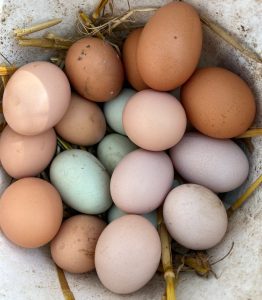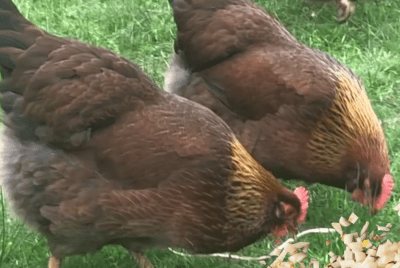When Do Chickens Start Laying Eggs
Introduction: When do Chickens Start laying Eggs
Brief overview of the topic
Personal enthusiasm and experience
As a chicken breeder people would text me questions and I became their go to guy for things they wanted to know. I’ve often been asked, “When do chickens start laying eggs?” It’s a question that holds a lot of excitement for backyard chicken enthusiasts. In this article, I’ll share my knowledge and personal experiences to help you understand when and how your feathered friends will begin their egg-laying journey.
Understanding Chicken Maturity

Factors Affecting Maturity
The age at which chickens start laying eggs varies, but it’s typically around 5 to 6 months. However, this can differ based on several factors.
Breed Differences
Some breeds, like Leghorns, start laying earlier, while others, like Wyandottes, may take a bit longer. Knowing your breed’s typical laying age is crucial.
Environmental Influences
Factors like the amount of daylight, diet, and overall health significantly impact when chickens start laying.
Signs of Laying Readiness
Physical Signs
Look for physical changes such as reddening of the comb and wattle, and the development of the pelvic bones.
Behavioral Changes
Behavioral cues include nest-seeking behaviors and more vocalization.
Health Issues
Monitor for signs of illness or distress, which can delay the onset of egg laying.

Optimal Conditions for Egg Laying
Diet and Nutrition
A balanced diet is essential for egg production. Ensure your chickens have access to quality layer feed, calcium, and clean water.
Housing and Comfort
Comfortable, safe, and clean housing encourages laying. Nesting boxes should be cozy and private.
Monitoring for signs of illness or distress in chickens is crucial, as these can significantly delay the onset of egg laying. Common indicators of illness include changes in behavior, such as lethargy or reduced interaction with the flock. Physical signs may include ruffled feathers, changes in droppings, or a decrease in appetite. Respiratory issues, evident through wheezing or coughing, can also be a concern. Distress can arise from environmental stressors like extreme temperatures, overcrowding, or predator threats. Regular observation of your chickens’ behavior and physical condition is key. Early detection of any abnormalities allows for prompt intervention, ensuring the health and well-being of your flock, which in turn supports regular egg production. A healthy chicken is more likely to lay eggs consistently, so prioritizing their health is not only beneficial for their well-being but also for maintaining a steady supply of eggs.
Environmental Stressors
Factors like extreme temperatures, predators, or overcrowding can hinder the laying process. Factors such as extreme temperatures, predators, or overcrowding significantly impact a chicken’s ability to lay eggs effectively. Extreme temperatures, both hot and cold, stress the birds, diverting their energy from egg production to maintaining body temperature. Predators cause fear and anxiety among chickens, leading to a decrease in laying due to stress. Overcrowding in the coop can lead to aggressive behaviors, pecking, and competition for resources like food and nesting space, all of which can negatively affect a hen’s ability to lay eggs regularly. Providing a calm, safe, and spacious environment is crucial for maintaining a healthy laying cycle in chickens. Proper coop management, including adequate space, temperature control, and predator-proofing, is essential to ensure your chickens are stress-free and able to lay eggs to their full potential.
Tips for Encouraging Laying
Dietary Adjustments
Introduce layer feed gradually as they approach laying age and ensure a consistent supply of fresh water.
Introducing layer feed gradually to chickens as they approach laying age is vital for their health and egg production. Around 16 to 18 weeks of age, start mixing layer feed with their regular diet. This feed is specially formulated to provide the necessary nutrients, particularly calcium, for strong eggshells and overall health. Consistency is key; abrupt changes in diet can stress chickens and affect egg laying. Alongside this, ensuring a consistent supply of fresh water is crucial. Chickens need ample water for egg production, and dehydration can quickly lead to a decrease in laying. Clean, accessible water should be available at all times to support their dietary needs and promote optimal egg production. This careful management of their diet and hydration supports not only their health but also maximizes their laying potential.
Enhancing the Coop Environment
Keep the coop clean and well-ventilated, and provide enough space for each chicken.
Maintaining a clean, well-ventilated coop is essential for the health and productivity of chickens. Regular cleaning prevents the buildup of harmful bacteria and parasites, which can cause disease and stress, affecting egg production. Proper ventilation is equally important; it reduces moisture and ammonia levels, ensuring a healthy respiratory environment for the chickens. Adequate space is also crucial. Each chicken should have enough room to move, feed, and rest comfortably to avoid stress and aggressive behaviors. Crowded conditions can lead to pecking and bullying, negatively impacting their well-being and laying capacity. Providing a spacious, clean, and airy habitat is key to keeping chickens happy, healthy, and productive.
The Golden Phase
The “Golden Phase” of egg laying refers to the period when hens are at their peak productivity in terms of egg production. This phase typically occurs when hens are about 6 months to 2 years old. During this time, hens lay the most eggs, often with greater frequency and consistency. The exact duration of this phase can vary based on factors such as breed, diet, and overall health, but it is generally considered the most prolific period in a hen’s egg-laying life. After this phase, egg production usually starts to decline gradually.
Myth Busting
Common Myths About Egg Laying
Debunking myths, such as the need for a rooster for hens to lay eggs.
Myth Debunking in chicken keeping is essential to ensure that both new and experienced poultry enthusiasts are armed with accurate information. One common myth is that hens need a rooster to lay eggs. In reality, hens will lay eggs regardless of a rooster’s presence; the rooster is only necessary for fertilization.
Another widespread belief is that older hens don’t lay eggs. While it’s true that egg production decreases with age, older hens can still produce eggs, albeit at a slower rate. There’s also a misconception that larger chickens lay bigger eggs. Egg size is more breed-dependent than size-related. Some smaller breeds can lay large eggs, while some larger breeds might lay smaller ones. Additionally, the color of the eggshell is often believed to indicate nutritional value, which is not the case. The shell color, determined by breed, does not affect the egg’s nutritional content.
Dispelling these myths is crucial for effective chicken care and understanding the egg-laying process. Accurate knowledge leads to better care practices and more realistic expectations about egg production.
The Role of Light

Natural vs Artificial Lighting
Understand the importance of light in regulating egg production. Natural light is best, but artificial light can be used to supplement in shorter days. I never use light to get the chickens to keep laying longer than their natural season because their bodies need to rest and recuperate.
Understanding the role of light in regulating egg production is crucial for healthy chicken keeping. Chickens are naturally responsive to daylight; longer daylight hours stimulate their egg-laying hormones. Natural light is the best source for this stimulation, aligning their laying cycle with the seasons. However, during shorter days, supplementing with artificial light can help maintain consistent egg production. It’s important to balance this: using artificial light to extend laying beyond natural seasonal rhythms can strain the chickens, as their bodies require rest periods to recuperate and maintain long-term health. Respecting their natural laying cycle by not overusing artificial light ensures the well-being of the hens and sustainable egg production.
A thoughtful approach to chicken keeping is to allow your hens to rest and follow their natural laying cycles is beneficial for their long-term health and well-being. By respecting their seasonal laying patterns and not using artificial light to extend their laying period, you are ensuring they get the necessary downtime for recovery. This method aligns with sustainable and humane poultry management practices. It is also likely to increase their life span.
Additionally, expanding your flock to maintain egg production rather than artificially stimulating your existing hens is a wise strategy. It not only provides continuous egg supply but also contributes to a more varied and dynamic flock, enhancing the overall environment for your chickens. Your approach exemplifies responsible and ethical chicken care.
When to Seek Help
Recognizing Abnormalities
Be aware of signs that indicate a need for veterinary advice, such as prolonged absence of laying or signs of discomfort in your hens.
Recognizing abnormalities in chickens is key to ensuring their health and well-being, which directly affects their egg-laying capabilities. Signs of potential health issues include changes in eating or drinking habits, lethargy, and abnormal droppings. Physical indicators, such as ruffled feathers, swelling, or wounds, should not be overlooked.
Behavioral changes, like decreased social interaction or unusual vocalizations, can also signal distress. Respiratory symptoms, such as coughing or sneezing, are particularly concerning. Early detection of these abnormalities allows for timely intervention, possibly preventing more serious health issues. Regular observation and familiarity with each chicken’s normal behavior are essential for identifying and addressing these signs promptly.
Consulting a Vet
Don’t hesitate to consult with a vet if you notice any health concerns.
Long-Term Care for Consistent Laying
Sustainable Practices
Adopt hesitate to consult with a vet if you notice any health concerns.
Seasonal Adjustments
Make necessary adjustments in care and feeding as seasons change.
Seasonal adjustments are crucial for the well-being and productivity of chickens throughout the year. In summer, providing shade and adequate water helps prevent overheating and dehydration. Ventilation is key to avoid heat stress. In winter, ensuring the coop is draft-free yet well-ventilated keeps chickens comfortable without being too cold. Extra bedding may be added for warmth.
Diet adjustments are also important; higher-energy food in colder months helps maintain body temperature and egg production. Being mindful of these changes helps chickens adapt to varying conditions, maintaining their health and consistent egg-laying regardless of the season. Adapting care practices seasonally is essential for a thriving flock.
Molting
Molting, the process where chickens shed and regrow their feathers, is a physically demanding period for them. During this time, hens typically stop laying eggs as their bodies focus on feather regeneration. Feathers are primarily composed of protein, so increasing the protein content in their diet during molting is crucial. Providing high-protein feeds, such as a specialized molting blend or supplementing with protein-rich foods like sunflower seeds, mealworms or cooked eggs, can significantly support this process. The extra protein helps in the efficient and healthy regrowth of feathers. Once the molting is complete, and their bodies have recuperated, hens usually resume laying eggs. This cycle highlights the importance of understanding and catering to the natural physiological processes of chickens for their overall health and well-being.
Personal Experiences and Success Stories

My Own Journey with Chickens
My fascination with chickens turned into a delightful obsession, leading me to acquire 22 different breeds. Each new, interesting breed I encountered seemed irresistible, compelling me to add them to my growing flock. This enthusiasm meant my partner tirelessly built more enclosures to comfortably house our diverse collection.
Keeping chickens is undeniably hard work; it demands time, effort, and a lot of care. However, the rewards far outweigh the challenges. From the rich variety of eggs to the unique personalities of each bird, the experience is phenomenal. It’s a deeply rewarding journey, filled with constant learning, joy, and an ever-growing appreciation for these wonderful creatures.
Lessons Learned about ‘When do Chickens Start Laying’
My experience with raising chickens has been an incredible learning journey, turning me into a sort of ‘chicken doctor’ over time. The wealth of knowledge I’ve accumulated is vast, covering everything from their daily care to recognizing and treating various health issues. I quickly learned the importance of being prepared for emergencies. Chickens are adept at hiding their illnesses, so by the time symptoms become noticeable, they might have been unwell for several days. This realization led me to keep a well-stocked medicine kit at all times. Immediate access to necessary medications and treatments is crucial, as prompt attention can be the difference between recovery and a more serious outcome or death.
Staying vigilant and ready to act has become a key part of my routine in ensuring the health and well-being of my flock. This aspect of chicken keeping, though challenging, has been immensely rewarding and a testament to the depth of care and commitment these wonderful animals inspire.
Conclusion on When Do Chickens Start Laying
Recap of key points
In conclusion, my journey with chickens has been an enriching and educational experience. Key points of this adventure include understanding the nuances of when chickens start laying and the factors affecting this process, such as breed differences and environmental conditions. Recognizing signs of laying readiness and maintaining optimal conditions for egg laying, including diet and housing, are crucial. Addressing challenges like health issues and environmental stressors, and debunking common myths have been part of my learning.
Seasonal adjustments, respecting the chickens’ natural laying cycle, and avoiding artificial light to extend laying periods reflect my commitment to ethical poultry management. My approach has evolved into a combination of keen observation, proactive health management, and adapting to the needs of a diverse flock.
This journey has not only been about egg production but also about the joy and fulfillment of caring for these amazing creatures, making me a more knowledgeable and compassionate chicken keeper.
Encouraging words for fellow enthusiasts
FAQs on When Do Chickens Start Laying Eggs
1.What is the average age chickens start laying eggs?
Chickens typically start laying eggs around 5 to 6 months old. However, this can vary depending on the breed and environmental factors.
2. How can I tell if a chicken is sick or stressed?
Signs of sickness or stress in chickens include changes in eating or drinking habits, lethargy, abnormal droppings, ruffled feathers, respiratory symptoms, and reduced social interaction. Immediate attention is crucial when these signs are observed.
3. Do different chicken breeds lay different types of eggs?
Yes, different breeds can lay different types of eggs. Egg color, size, and frequency of laying can vary significantly between breeds. For instance, some lay colored eggs like blue or green, while others lay larger or smaller eggs.
4. How important is the coop’s environment for egg laying?
The coop environment is extremely important for egg laying. It should be clean, well-ventilated, predator-proof, and spacious enough to prevent stress and promote health. Proper nutrition and access to fresh water are also essential.
5. Can chickens lay eggs without a rooster?
Yes, hens can lay eggs without a rooster. The presence of a rooster is only necessary for the eggs to be fertilized. Unfertilized eggs are what we commonly consume and are laid by hens irrespective of a rooster’s presence.
Chicken Tractors For Your Flock
How to get Rid Of Flies In A Coop
Rose Petals in the Chicken Coop
How to protect Chickens from Predators















